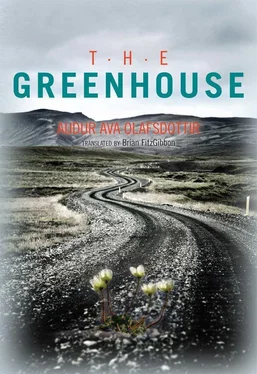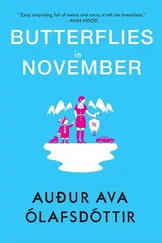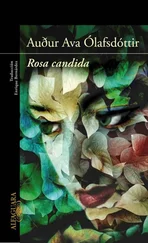I lift up the floral dress and pull off her stockings. Then I unfasten two poppers on some kind of bodysuit underwear. There’s just the diaper left. My daughter smiles from ear to ear; then she splutters, and finally the sounds seem to change into syllables: da da da da .
— She’s not saying daddy , she’s practicing her consonants, Anna says abruptly, and I almost sense a crack in her voice. She’s probably tired; the child, on the other hand, looks rested and happy.
I remove the diaper. No question about it, she’s a girl.
— You don’t have to powder or put cream on her every time, Anna explains. She stands beside me, watching me with an apprehensive air. I lift up the bodysuit slightly to see the bulge of her tummy, her navel gently protruding from the summit of the dome of her belly like a bell. She has a tiny birthmark on her groin in the exact same spot as me. So that’s two traits she’s inherited from her father’s side: the earlobes and birthmark, three if we throw Mom’s dimples into the equation. I can’t stop myself from bending over and blowing lightly on her tummy. The child giggles. Then I stoop down slightly farther and kiss her stomach. The child smells good. I’m not sure how the woman who is watching me is taking this; she has an indecipherable look on her face, as if she were on the verge of tears.
— Do you have any experience with children? Anna asks. She looks at me as if she is starting to regret this whole affair.
— No, actually.
It’s true, I don’t feel I can mention the fact that I still hold my disabled twin brother’s hand.
— But I feel OK about it, I add.
When I’ve finished changing my daughter, she holds out her hands and smiles at me. I smile back. Keeping her arms outstretched, she tenses her tummy. She’s stopped smiling and has, in fact, started to whimper, although no tears are visible. Finally she turns over on her stomach and sits up by herself.
— She wants to be picked up, says my interpreter, the child’s mother, as if she is somehow relieved. I bend over and lift the child off the bed.
Next she teaches me how to use the stroller. There are two positions, one so that she can sit up and look at people and her surroundings. In fact, Flóra Sól is very interested in people and her surroundings, says her mother. Then there’s the other position: Like this, she says, pressing a button and pushing the bottom of the buggy up — then you have a carriage that Flóra Sól can sleep in. I nod; it seems pretty straightforward. I’m not sure I’ve got it all right, though, but I’m sure I’ll figure it out, I can always practice the settings when the child is asleep.
— She has three pacifiers, says the mother. She hangs the pink changing bag on my shoulder to show me how to carry it around. Then she also needs to explain to me how it works. It’s like a soft tool bag, with countless side pockets and compartments in which you can store spare diapers and stockings, and keep creams, extra pacifiers, and wipes, says Anna, except that you can also open it up on all sides and flatten it out so that it turns into a changing table. The child’s mother has learned all these tricks and more in less than nine months. The future genetics expert’s skills leave me in awe. How can a young woman, a biology student, change into a mother in such a short time?
— This will be for four weeks at the most, she says, but with an expression that seems to say there’s no way she’ll be able to handle it. All going well, three and a half.
— Don’t worry, I say.
— Are you sure it’ll be OK? she asks, although I’ve already twice confirmed, against my better judgment, that everything will be just fine. I lift her daughter up to show her how easy it’ll be and how good I feel about being alone with the child for four weeks, and she giggles and laughs. Then she places her little palm on my face and pats my cheek; she’s aware of her responsibility.
— She’s very tender, always wants to pat people, her mother explains.
— Da-da, says my daughter and then lays her head on my shoulder, right under my cheek.
— I’ll have loads of things to do with my thesis, then I’ve got to sort out accommodation and get the application forms for colleges. You can always call me, of course, she says, handing me a note with two telephone numbers on it. If I’m not there just leave a message. She’s got that verging-on-tears look again.
Then I remember the meal that I’ve spent half the day preparing.
— I’ve cooked a meal, I say again, and I don’t ask her what time her train is leaving.
— Thanks, she says, relieved.
It was a fair while ago, actually, so I need to heat up the meat and potatoes again and make some red wine sauce. I didn’t think of asking the butcher about any side dishes, so I just boiled the potatoes, carrots, and cabbage together in one pot. I shift the vase with roses and lay three plates on the table, two side by side and one opposite. The girls are watching me. Anna takes out a cup with a lid and a spout for the child and places it beside one of the two plates that are beside each other.
— Flóra Sól can eat meat so long as it’s minced into tiny pieces, she says.
My child’s mother eats two helpings of food and praises it to the heavens. She’s obviously hungry.
— This is really good, she says.
We drink whatever wine didn’t go into the sauce. Dad made a dessert for me when I was leaving, but I haven’t made any now.
— I’m taking the train tomorrow morning; is it OK if I stay tonight? Anna asks, averting her gaze. I can sleep on the sofa, she quickly adds, having checked the setup in the apartment.
I surrender my bed to the girls and pull out the sofa bed for myself. Anna puts the child to bed and dresses her in a night bodysuit with pictures of puppies on it. She rubs some cream into her daughter’s cheeks, brushes her eight teeth, and combs the curls on her forehead back to one side with a wet, soft brush. Then she brings her over and gets her to kiss me good night. Flóra Sól sticks the pacifier in her mouth herself, and I see her resting her head on her mother’s shoulder as they disappear into the bedroom.
I wash up and Anna reappears a short while later; she’s tired and wants to doze off with the child.
— Thank you so much for the great meal, she says. And thanks for taking this thing with Flóra Sól so well. It really saves me.
Then she says good night.
— Good night.
— Good night.
It’s weird to think of the mother and daughter in the next room; it’s just like it was nine months ago in the maternity ward, we’re all sleeping under the same roof again. I wonder whether it would be appropriate to go out in the evening, but don’t feel like leaving Anna alone in the apartment with the child. There’s no point in me groping around the rose garden in the pitch dark either. And even though I would undoubtedly be welcome to some black currant liqueur and a movie at Father Thomas’s, I can see from the clock that I’d arrive in mid-film.

The following morning I wake up early. I bought everything we needed for dinner yesterday; now I need to buy breakfast. For the first time in two months I don’t go to the garden.
I don’t quite know what to buy, but come home with a packet of coffee, tea, bread, butter, bananas, cheese, and oatmeal. In the end, I also buy two buns. I bought the milk yesterday. By the time the girls come out, freshly woken and rosy cheeked, I’ve made porridge, something I learned from Dad, who always used to make porridge for Jósef and myself in the morning.
Читать дальше













